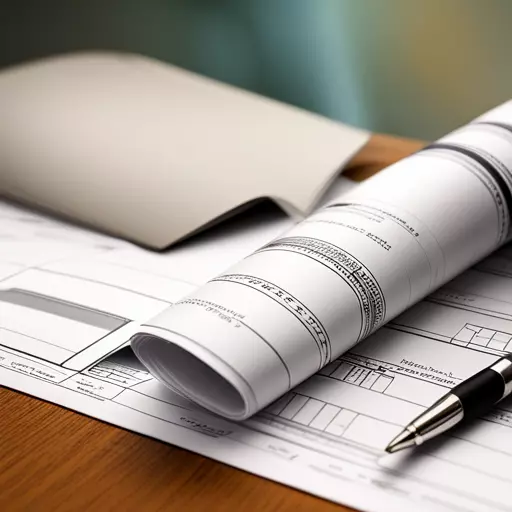What Documents and Paperwork Do I Need to Prepare for the Home Buying Process?
Introduction
Buying a home is an exciting and significant milestone in one's life. However, the process can be overwhelming, especially when it comes to the necessary documents and paperwork. If you're planning to purchase a property in Fargo-Moorhead, you've come to the right place. In this comprehensive guide, we will walk you through the essential documents and paperwork you need to prepare for a smooth home buying process. The Elm Group, brokered by REAL, is dedicated to providing you with the expertise and support you need throughout this journey.
Table of Contents
- Pre-Approval Letter: Your Key to Success
- Proof of Identity and Residency
- Financial Statements and Proof of Income
- Employment and Income Verification
- Tax Returns and W-2 Forms
- Bank Statements
- Credit History and Credit Reports
- Property Information and Purchase Agreement
- Homeowners Insurance
- Appraisal and Inspection Reports
- Title and Title Insurance
- Survey
- Closing Disclosure
- Home Warranty
- Power of Attorney
- Additional Documents
- FAQs
- What is a pre-approval letter?
- Why is a pre-approval letter important?
- What happens if I don't have a pre-approval letter?
- How can I obtain proof of identity and residency?
- What documents are needed for employment and income verification?
- What is the role of title insurance in the home buying process?
- Conclusion
Pre-Approval Letter: Your Key to Success
To kickstart your home buying journey, obtaining a pre-approval letter is crucial. This document demonstrates to sellers and real estate agents that you are a serious buyer with the financial capacity to make a purchase. The pre-approval letter is issued by a lender after assessing your financial information, including your credit score, income, and debt-to-income ratio.
Proof of Identity and Residency
To establish your identity and residency, you will need to provide certain documents. These may include a valid driver's license, passport, or government-issued identification card. Additionally, you may be required to provide proof of residency, such as utility bills, lease agreements, or bank statements with your current address.
It's important to ensure that all documents are current and valid. If you have recently moved or your identification documents are outdated, make sure to update them before starting the home buying process. These documents will be necessary for various stages, including mortgage applications and closing procedures.
Financial Statements and Proof of Income
Lenders will want to assess your financial stability and ability to repay the mortgage. As part of the home buying process, you will need to provide financial statements and proof of income. These documents help lenders determine your eligibility for a loan and the amount you qualify for.
Financial statements typically include bank statements, investment account statements, and statements for any other assets you may have. These statements provide a snapshot of your financial health and demonstrate your ability to cover the down payment, closing costs, and ongoing mortgage payments.
Proof of income can include recent pay stubs, employment verification letters, and income tax returns. These documents confirm your employment status, income level, and consistency of earnings. Lenders use this information to assess your ability to meet monthly mortgage obligations.
Employment and Income Verification
During the home buying process, lenders will verify your employment and income details to ensure stability and ability to repay the loan. They may contact your employer directly or request additional documentation. Be prepared to provide the necessary information promptly to avoid delays in the approval process.
Employment verification may involve submitting recent pay stubs, a letter from your employer, or providing contact details for your human resources department. Lenders may verify your position, length of employment, and income stability.
Tax Returns and W-2 Forms
Tax returns and W-2 forms are essential documents for mortgage applications. Lenders typically require the most recent two years of tax returns and W-2 forms from all borrowers. These documents provide a comprehensive overview of your income, deductions, and tax liabilities.
Make sure to keep copies of your federal and state tax returns, including all schedules and attachments. If you're self-employed or receive income from rental properties or investments, you may need to provide additional documentation, such as business tax returns or rental income statements.
Bank Statements
Bank statements are crucial for verifying your financial stability and the availability of funds for down payments and closing costs. Lenders usually request the most recent two to three months of bank statements.
When submitting bank statements, ensure that they are complete and include all pages. Lenders review these statements to assess your cash flow, identify any irregularities, and verify the source of funds for your home purchase. It's important to maintain clean and organized statements to streamline the approval process.
Credit History and Credit Reports
Your credit history plays a significant role in the home buying process. Lenders use your credit score and credit reports to evaluate your creditworthiness and determine the terms of your mortgage.
Obtain a copy of your credit report from each of the three major credit bureaus—Experian, Equifax, and TransUnion. Review the reports carefully for any errors or discrepancies and address them promptly. A higher credit score generally leads to better loan terms and interest rates.
To improve your creditworthiness, focus on paying bills on time, reducing outstanding debt, and avoiding new credit applications or major purchases before and during the home buying process. Demonstrating responsible credit management strengthens your chances of securing favorable financing.
Property Information and Purchase Agreement
Once you have found a property you wish to purchase, you'll need to gather and provide specific information about the property itself. This includes the address, legal description, and details of the property's features and amenities. This information is crucial for creating a purchase agreement, which is a legally binding contract between the buyer and seller.
The purchase agreement outlines the terms and conditions of the sale, including the purchase price, financing arrangements, contingencies, and closing date. It is important to review the purchase agreement carefully and seek legal advice if needed to ensure all aspects of the transaction are properly addressed and understood.
Homeowners Insurance
Homeowners insurance is a vital requirement when buying a home. It protects you and your lender from financial loss in case of damage to the property due to events like fire, theft, or natural disasters. Lenders typically require proof of homeowners insurance before finalizing the mortgage.
When purchasing homeowners insurance, obtain multiple quotes from reputable insurance providers to ensure you find the coverage that suits your needs and budget. The policy should provide adequate coverage for the property's structure, personal belongings, and liability protection.
Appraisal and Inspection Reports
During the home buying process, it is common practice to have the property appraised and inspected. The appraisal determines the fair market value of the property, while the inspection assesses its condition and identifies any potential issues or necessary repairs.
The lender usually arranges for an appraisal to ensure the property's value aligns with the loan amount. Additionally, a home inspection is conducted by a professional inspector to evaluate the property's structural integrity, systems (such as plumbing and electrical), and overall safety. These reports help protect the buyer's interests and provide peace of mind.
Title and Title Insurance
Title refers to the legal ownership of a property. Before finalizing the purchase, it is crucial to conduct a title search to ensure there are no existing liens, claims, or encumbrances that could affect your ownership rights.
Title insurance protects the buyer and lender from any unforeseen issues with the property's title, such as undisclosed heirs, previous unpaid mortgages, or legal disputes. It provides financial coverage for legal fees and potential losses associated with title defects.
Survey
A property survey is an essential document that outlines the property's boundaries, easements, encroachments, and any other relevant details. It helps ensure that there are no boundary disputes and provides an accurate representation of the property's size and features.
The survey is typically ordered by the lender or buyer and conducted by a professional surveyor. It is an important step to verify that the property's boundaries align with the legal description and to identify any potential issues before completing the purchase.
Closing Disclosure
The closing disclosure is a detailed document that outlines the final terms of your loan, including the loan amount, interest rate, monthly payments, closing costs, and other expenses. It is provided by the lender at least three business days before the closing date.
Review the closing disclosure carefully to ensure accuracy and consistency with the terms agreed upon in the purchase agreement. If you have any questions or notice any discrepancies, address them with your lender promptly to avoid delays or misunderstandings during the closing process.
Home Warranty
A home warranty is a service contract that provides coverage for repairs or replacement of major home systems and appliances. It offers protection against unexpected breakdowns and can provide peace of mind to buyers, especially for older homes or properties without existing warranties.
Consider obtaining a home warranty to protect yourself from potential costly repairs during the initial period of homeownership. Research reputable home warranty providers, compare coverage options, and carefully review the terms and conditions before making a decision.
Power of Attorney
In certain situations, buyers may need to grant someone else the power to act on their behalf during the home buying process. This is done through a legal document called a Power of Attorney (POA). A POA authorizes a designated person, known as the attorney-in-fact or agent, to make decisions and sign documents on the buyer's behalf.
A Power of Attorney can be useful if the buyer is unable to be present for important steps in the home buying process, such as the closing. It is important to consult with a legal professional to understand the requirements and implications of granting a POA and to ensure that the document is properly executed.
Additional Documents
In addition to the aforementioned documents, there may be additional paperwork required during the home buying process. These documents can vary depending on the specific circumstances and requirements of the lender, seller, or local regulations. Some examples of additional documents that may be requested include:
- Homeowner's association (HOA) documents: If the property is part of an HOA, you may need to review and provide documents such as bylaws, rules and regulations, and financial statements.
- Gift letter: If you are receiving funds from a family member or friend to assist with the down payment or closing costs, a gift letter may be required to verify that the funds are a gift and not a loan.
- Rental history: If you are currently renting, you may need to provide documentation of your rental history, such as lease agreements and payment receipts.
- Divorce or separation documents: If you are divorced or separated and your spouse's financial information is relevant to the home purchase, you may need to provide divorce decrees, separation agreements, or other legal documents.
It is essential to stay in close communication with your lender and real estate agent throughout the process to ensure that all necessary documents are prepared and submitted in a timely manner.
FAQs
What is a pre-approval letter?
A pre-approval letter is a document issued by a lender that confirms your eligibility for a mortgage loan based on a preliminary assessment of your financial information. It demonstrates to sellers and real estate agents that you are a serious buyer with the financial capacity to make a purchase.
Why is a pre-approval letter important?
A pre-approval letter is important because it gives you a clear understanding of your budget and helps you determine the price range of homes you can afford. It also strengthens your position as a buyer and gives you an advantage in a competitive market.
What happens if I don't have a pre-approval letter?
If you don't have a pre-approval letter, you may encounter difficulties in the home buying process. Sellers and real estate agents may view your offer as less competitive, and some sellers may not consider your offer at all. It is highly recommended to obtain a pre-approval letter before beginning your home search.
How can I obtain proof of identity and residency?
You can obtain proof of identity and residency by providing documents such as a valid driver's license, passport, or government-issued identification card. Additionally, utility bills, lease agreements, or bank statements with your current address can serve as proof of residency.
What documents are needed for employment and income verification?
For employment and income verification, you may need to provide recent pay stubs, employment verification letters, and income tax returns. Lenders use this information to assess your stability and ability to repay the mortgage.
What is the role of title insurance in the home buying process?
Title insurance plays a crucial role in the home buying process. It provides protection to the buyer and lender against any potential issues or defects in the property's title that may arise in the future. The title insurance company conducts a thorough title search to identify any existing liens, encumbrances, or other title issues that could affect the buyer's ownership rights.
Title insurance provides coverage for legal fees, court costs, and potential losses associated with any claims or disputes over the property's title. It ensures that the buyer has clear and marketable ownership of the property, giving them peace of mind and financial protection.
Conclusion
In conclusion, preparing the necessary documents and paperwork is an essential part of the home buying process. By having all the required documents ready, you can streamline the process and ensure a smooth and successful transaction. From pre-approval letters to property information, financial statements to title insurance, each document serves a crucial purpose in establishing your eligibility, protecting your interests, and securing your investment.
The Elm Group, brokered by REAL, is dedicated to guiding you through the home buying process in Fargo-Moorhead. With their expertise and experience, you can confidently navigate the documentation requirements and achieve your dream of owning a home. Remember to stay organized, seek professional advice when needed, and communicate closely with your lender and real estate agent to ensure a seamless journey to homeownership.
Recent Posts











"My job is to find and attract mastery-based agents to the office, protect the culture, and make sure everyone is happy! "
